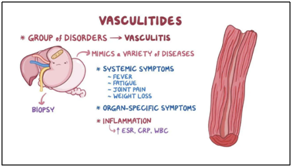

Context
- Hollywood actor Ashton Kutcher had a “weird, super rare form of vasculitis” that affected his vision, hearing, and equilibrium.
About
- A vasculitis is a group of disorders that destroy blood vessels by inflammation. It is also called angiitis(“inflammation within blood vessels”) or arteritis (“inflammation in arteries”).
- It is an auto-immune disease in which the body’s immune system turns on healthy blood vessels, causing them to swell up, narrow down, stretched, or be weak. The blood vessels might close entirely.
- In vasculitis, the body’s immune system turns on healthy blood vessels, causing them to swell up and narrow down.
- The trigger for vasculitis may be an infection or a drug or blood cancer or immune system diseases, although the precise reason is often uncertain or unknown.
- Vasculitis can be only a minor problem affecting the skin, or it can be a serious condition that impacts the heart, kidneys or other vital organs.

Causes:
The exact cause of vasculitides (plural of vasculitis) is multifactorial (genes, gender, and environment) and is unknown. Secondary vasculitis is due to a known cause and appears in the course of other defined diseases. Some causes of secondary vasculitis are listed below:
- Infection - Viruses (Hepatitis B and C, HIV, Varicella zoster, etc.), bacteria (TB, gonorrhoea, streptococci, staphylococci, etc.), fungi, and others (e.g., syphilis)
- Cancer - Most malignancies (solid organ tumours, lymphoma, and others).
- Drugs - Vaccines and desensitization agents, drugs used for nasal allergies (montelukast and others from this group), propylthiouracil, hydralazine, heroin, cocaine, amphetamine, etc. The vasculitides appear after prolonged exposure to the drug, are usually limited to the skin, and disappear on early withdrawal of the offending agent.
Types of Vasculitis: There are around 20 different disorders that are classified as vasculitis. A few important among them have been given below:
- Polyarteritisnodosa: This affects small- to medium-sized blood vessels in many different parts of the body, especially the skin, intestines, kidneys and nerves.
- Takayasu's arteritis: This vasculitis affects medium and large-sized arteries, especially the aortic arch and its branches near the heart. It most commonly affects teenage girls and young women, and it is most common in Asia.
- Kawasaki disease: This vasculitis affects the lymph nodes, skin, mucous membranes, and heart, including the coronary arteries (arteries that supply blood to the heart). It is seen most commonly in children.
- Behcet’s Disease: Oral and genital ulcers and eye inflammation.
- Buerger’s Disease: Mainly affects smokers and leads to decreased flow of blood to the hands and feet.
- Churg-Strauss Syndrome: Associated with asthma, and sinusitis, and tends to involve the lungs, kidneys, and heart as well.
- Lecocytoclastic Vasculitis: Purpura, skin rashes
How is vasculitis treated?
Medication:
- The treatment primarily focuses on controlling the inflammation and managing any underlying conditions that may be triggering vasculitis. The medication used depends on the type of vasculitis that is present.
- Steroids and other medicines that reduce the activity of the immune system are frequently prescribed. It includes corticosteroids to control the inflammation so that the dosage of corticosteroids can be tapered more quickly.
- Health organizations caution that some kinds of vasculitis can become serious problems if not treated.
|
About Corticosteroids:
|
Surgery:
- Sometimes, vasculitis causes a bulge or ballooning in the wall of a blood vessel. This bulge may need surgery to reduce the risk of it rupturing.
- Blocked arteries also may require surgical treatment to restore blood flow to the affected area.

